![]()
![]()
This will be the first of three posts on the movies of John Carpenter and David Cronenberg. Sadly the Cronenberg movies "M Butterfly" (1993) (RT score: 44%) and "Fast Company" (1979) (RT score: 75%) are so far unavailable to me, however I have been able to see every other movie from these two fantastic directors and what follows is my assessment of their respective bodies of work, asides from those two exceptions.
What is interesting about John Carpenter and David Cronenberg is that even their worst movies tend to have something interesting about them. This post shall deal with the worst of their movies, but later posts shall deal with their good movies and their best movies. This particular post shall take the form of a countdown.
The Six Worst - John Carpenter6, Dark Star (1974)
![]() My review
My review was as follows:
Low budget silly sci-fi movie. I can see how this might have inspired Red Dwarf, but it was closer in its feel to Hyperdrive. There were even a few bits which seemed reminiscent of Hitchhikers’ Guide. The slapstick struggle with the less-than-appreciated alien life form and the polite but insistent bomb deployment system were both great fun. However, the comedy is not always terribly funny and tone of the movie is not always consistent. The movie could have done with being rather less 2001-esque (what was with the glass-water music?), but all-in-all I’d say the merits just about outweigh the faults making the a good if not perfect debut from John Carpenter.
This movie has some great sci-fi comedy moments with some really good dark humour. However, with some drawn out scenes, no real sense of direction and a very obviously low budget it's hard to really get involved.
My Score: 3.5/5
Current Rotten Tomatoes Score: 81%
5. Prince Of Darkness (1987)![]() My review
My review was as follows:
Quite an awkward John Carpenter movie to get hold of and I'm glad I decided to make the effort. However, it really isn't one of Carpenter's best, nor is it terribly good. It contains some interesting imagery and similar themes to John Carpenter's far superior "In The Mouth Of Madness". The character's are set up pretty well, but the guy we are expected to think of as the male lead starts off (unintentionally) creepy and there are few points where the characters seem to have a rather bizarre sense of humour.
What is most impressive about this movie is just how absurd and ridiculous the underlying premise is. Sure, I went in with an open mind, but when a horror movie starts trying to talk about the relationship between religion and science it's the sort of thing I'd normally expect to have me screaming in irritation. The script carefully avoids sounding too daft by focussing on the philosophical issues of uncertainty at a sub-atomic level, keeping scientists consistently sceptical, and by completely contradicting Church dogma. As such, not only is this not taking pot-shots at the scientific method or insisting that science can somehow prove God's existence, but even the religious viewpoint being explored is a kind of Manichean theology rather than traditional Christianity. As such, we've got a premise which doesn't spoil your suspension of disbelief by having too much relevance to real-world discoveries or belief systems, yet Carpenter is still able to get us to go along with it and take it (almost) seriously. The soundtrack has a similar feel to Carpenter's classic "The Thing" and it really helps to pull you in.
As the movie goes on the scientific input becomes less and less important which, while somewhat of a relief, this makes a lot of the early part of the movie feel pointless. In the end we have something akin to an "awakening of Cthulu". While this is done well enough, I find myself giving the movie the following summary: "Cthulu without the tentacles". 'Nuff said.
What I hadn't realised when I made my review, was that John Carpenter normally scores his own movies. "The Thing" is actually an exception to this, but even so Ennio Morricone was basing his score on music from other John Carpenter movies. Perhaps the biggest problem with the movie is that, for most of the movie, the EVIL seems to be able to do anything it wants. The EVIL is supposedly trapped in a container from which it cannot escape, yet that doesn't seem to stop it spraying people with evil goo. The EVIL also seems to be capable of controlling a group of people outside (led by Alice Cooper) who seem to be capable of turning someone into a weird zombie-like figure full of rats. The function of the people outside seems to be to provide a similar sense of being under seige as was found in Carpenter's "Assault On Precinct 13", but with little explanation as to why they are there it all feels a little odd. In the end, while this movie has the same creepy feel of other John Carpenter movies the story all feels a bit slap-dash. Also, though we are following a whole group of characters, the one we seem to be expected to consider the protagonist is not terribly likeable nor easy to empathise with.
My Score: 2.5/5
RT Score: 47%
4. Memoirs Of An Invisible Man (1992)![]()
This was actually really good. The effects were used effectively (In the above image some makeup has come off around the lips revealing the false teeth in a rather disturbing way). Sam Neil gives the most fantastic performance as the bad guy, but sadly the central performance from Chevy Chase is rather less impressive. In the end, the movie cannot really survive without a decent central performance. While the dialogue suggests that the main character is selfish and a bit of a loner, Chevy Chase's performance suggests nothing much worse than a "lovable rogue". Chevy Chase simply doesn't seem to able to express the range of emotions to portray a character with depth and this puts severe limits on our investment in the story.
My Score: 2.5/5
RT Score: 24%
3. Ghosts Of Mars (2001)![]() My review
My review was as follows:
John Carpenter does aliens on Mars and unfortunately the biggest problem is that it's neither terribly exciting nor particularly intelligent. Apparently the society on Mars in the future is a matriarchy, though in the scheme of things this seems to make very little actual difference (though I suppose we should be grateful for this since apparently heterosexuality amongst women is also supposed to be quite rare in this future society *rolls eyes*).
Basically the bad guys are the reavers from Firefly. Yes, this came first, but in Firefly they are sensible enough not to make alien posession the explanation for the reavers' decision to self-mutilate and slaughter. The movie is fun enough if you think of it as popcorn fodder and don't let your expectations get too high. This is currently John Carpenter's latest movie to be released, so here's hoping that The Ward is an improvement when it comes out.
An early Jason Statham B-movie which ends up being mostly about the gore.
My Score: 2/5
RT Score: 19%
2. Starman (1984)
![]()
I started off thinking this had a chance. The scene where the alien first develops into a clone of the female protagonist's dead husband is very well done and the alien technology involving weird silver balls that Jeff Bridges' alien carries around with him are very well done too. Initially the alien's limited vocabulary is explained by the information about mankind which was sent into outer space in the hope that aliens would find it. This leads to some humour when Jeff Bridges keeps saying "greetings" to anyone he meets for the first time.
The point where the movie first goes downhill would seem to me to be when Jeff Bridges is suddenly able to read. It's not just that his character shouldn't be able to read that easily, but also that the whole film is littered with scenes where the alien asks his friend to "define 'love'", "define 'beautiful'", "define 'bozo'", "define 'shit'". With all the words that the alien seems to have no trouble with whatsoever, this becomes irritating and makes it very hard to suspend disbelief.
Later on in the film the alien starts asking about "having babies" (I'll leave you to work out what stupid direction that leads) and the army decide that they are going to destroy the alien for absolutely no reason whatsoever. "Run ET the government is here!" *facepalm* In spite of some promising elements and some decent effects, this movie is still very disappointing.
My Score: 2/5
RT Score: 78%
Very worst John Carpenter Movie: Village Of The Damned (1995)
This movie is like a geek trap. The main characters include a vulcan from "Wrath Of Khan", Luke Skywalker and Superman. How could any geek resist?
![]()
![]()
Sadly no one comes off looking very good, but none of the actors seems quite as dreadful as Kirstie Alley, who as well as appearing in "Wrath Of Khan" you might also recognise from "Look Who's Talking".
![]()
![]()
![]()
(Having searched for those images, I now feel a little guilty to be badmouthing her. The internet seems to be obsessed with her weight-gain. That said, she appears to have a website dedicated to selling weight-loss products.)
The problem with Kirstie Alley's performance in "Village Of The Damned" is that she seems to have forgotten that she's no longer playing a vulcan. While her character is supposed to be ultra-rational and emotionally detached, there are points where she really ought to be emotionally affected. (Y'know like when an alien psychic is compelling you to slice yourself open with a scalpel, for example.) Not only that, but she often appears smug without any good reason for it.
One benefit of Village Of The Damned is that it now features women, while in the original movie the cast was mainly male. This doesn't help much though, since the decision-makers are still men. Still, it does move things just that little bit closer to the plot of the book where a major issue was the connection the mothers felt to their alien babies.
Back to downsides, there seems to be a need to portray one of the aliens as different from the others. As such, David is portrayed as experiencing emotions which the other aliens seem unable to understand. Meanwhile the rest of the alien children are portrayed as unquestionably evil. This is very different from the situation in the original movie where it was made very clear that the children are mainly interested in their own safety.
The explosions in the remake are daft. There's one bit where a car drives into something and explodes. I know that it's a long held tradition to have cars exploding unnecessarily in movies, but it just looked silly. What's more, a small plane crashes in the original 1960s movie with much greater dramatic effect.
Perhaps the most ridiculous element added to the remake was the alien baby who is stillborn. One of the scariest things in the original movie was that the alien children look exactly like ordinary humans. Not so terrifying is a stillborn baby that looks like the typical cliched alien like you see in Independence Day:
![]()
Yeah, sorry, not shocked by that. Just disappointed.
Overall, this movie was thorougly cheesy, but not much fun.
My Score: 1/5
RT Score: 30%
The Seven Worst - David Cronenberg7. Shivers (They Came From Within) (The Parasite Murders) (1975)![]()
Cronenberg's first major film is a sort of zombie movie (if you like) about parasites which increase your libido and pervert your mind. While 28 Days/Weeks Later zombies represent the unthinking violence of rioters, Cronenberg's "Shivers" has zombies which represent the unthinking lust of an orgy... or something.
So, does this need a trigger warning? (Admittedly, I've not normally been concerned about trigger warnings, but when I find myself mentioning the r-word, I feel I ought to consider it.) The film essentially involves rape, but the mind-control element means that victims are never non-consenting for long. (Then again, that's part of what makes it so horrific.) And for a movie about sex-crazed zombies, there's not really much sex depicted.
The movie is actually quite slow-moving, but the last twenty minutes really struck me. The movie ends really powerfully and hits you with the full force of the horror that has been gradually building. Unfortunately, the movie is very obviously low-budget and the character development isn't great. Still, this is one worth checking out, even if it's certainly one of Cronenberg's less impressive movies.
My Score: 3.5/5
RT Score: 84%
6. Spider (2002)![]()
I'm really not sure what condition Ralph Fiennes' protagonist is suffering from. Still, as he tries to figure stuff out, the movie gradually reveals his backstory which led him to be in psychiatric care.
Miranda Richardson is quite awesome, as always, oddly playing both Ralph Fiennes mother and his father's lover. His father is played by Gabriel Byrne. The problem is that all the characters feel rather distant and the slow-moving plot feels rather too mixed-up to pull us in.
Still, unlike some of the films coming up further down the list, this does at least have a proper plot and isn't just leading the audience up the garden path. I can't really fault the performances, but strangely this film feels more like a television programme than a movie.
In the end, the biggest problem with this movie is that it is severely lacking in excitement and the revelation at the end is rather under-whelming. There's simply not a big enough payoff to make this worth your while. Still, your mileage may vary, so I've ended up rating this as "average". It really is. Very much so. You have been warned.
My Score: 3/5
RT Score: 85%
5. eXistenZ (1999) ![]() My review
My review was as follows:
David Cronenberg does a science fiction movie about video games. It starts off with some compelling ideas. In a future where computer games are all-immersive a good game designer can provide experiences which can border on spiritual. Game designers are superstars and adoring fans can consider their gaming experiences life-changing. However, there are also reactionary figures and in the first section of the movie a celebrity game designer is attacked by a gun made entirely out of flesh and bone which fires teeth. So perhaps it's not surprising that the anti-gaming group are using non-technological methods, except that this doesn't distinguish them from the gamers whose games machines are also organic like an animal. It's with this set-up that Cronenberg is able to make us understand playing a game as a much more natural biological experience and this sets "eXistenZ" apart from Mamoru Oshii's "Avalon". Sadly another way it is set apart is in its ridulously contrived plot and totally unappealing gaming experience (why are they working on a conveyor belt in a trout farm???). Despite some interesting ideas towards the beginning there's no real plot to speak of and it never really comes together. The whole movie becomes too much style over substance and, especially with this coming out during the same year as The Matrix, the theme of "do you really know what is real" felt particularly cliched.
This is a fantastic example of how a dreadful movie can be saved by Cronenberg's incredible imagination.
Cronenberg, clearly trying to avoid making yet another Videodrome about videogames instead of TV, ends up providing us with one of the most boring videogames imaginable. In the games people occasionally get shot, but not often. Instead games seem to involve pre-decided speech (admittedly found in games, but normally as a build up to something more interesting) and putting bits of fish together on a conveyor belt (actually a plausible element in a real game, except that the protagonist seems to perform the action automatically). Thankfully the characters in the movie have the decency to acknowledge that the game seems to follow arbitrary rules, but sadly they don't seem to think anything needs to be done about this.
Also weird, sexual, dare I say "vaginal", holes are made in the body in order to plug in the video game machine. Ah Cronenberg, you sick weirdo. :p
I am very pleased to say that all the flaws in this movie are plot-related. By that I mean to say that the characters feel developed and engaging with good chemistry between the male and female protagonist, the acting is well done, the visuals are often striking, some ideas explored in the movie are particularly imaginative and the soundtrack never serves to pull you out of the action. Sadly the plot is rather important and in this movie it's practically nonexistent.
My Score: 2.5/5
RT Score: 71%
4. Naked Lunch (1991)![]()
This actually comes pretty close to having a plot, but it's a little uncertain what this movie is trying to say about murdering your wife. *gulp* I'm also not entirely sure what this movie is trying to say about homosexuality, since it seems to be portrayed as some kind of subversive act. Perhaps that's how William S. Burroughs (the author whose work this is adapted from) saw it.
The movie opens with some absolutely dreadful jazz music. I'm afraid this isn't the only Cronenberg film I'm going to be criticising for its choice of musical score, but that squeaky and melody-less trumpet noise is seriously offputting.
Anyway, the visuals in this movie are quite incredible and somehow Cronenberg manages to really pull you into his abstract movie. Unfortunately it is perhaps a little too abstract for those of us not familiar with Burrough's literature. Unlike in the case of "Videodrome" where the imagery seemed to add to the message, in this case it seems to do very little asides from indicate that the author was on a lot of drugs. Still there's something rather intriguing about the typewriters which are also cockroaches which are also spooks which our protagonist goes on missions for. Bizarrely William's missions seem to mainly involve having sex.
Towards the end we are told a story about a man who teaches his arsehole to talk. It's quite a memorable scene, but I've little idea of how to interpret it, nor does it appear to have much relevance to the rest of the movie. Perhaps it'll be argued that I don't "get" this movie or possibly that I'm wrong to expect it to make sense, but I can't help but feel that some of the blame surely falls on the presentation itself. Still, one things for certain and that's that the presentation is helped greatly by the acting talents of Peter Weller (Robocop) who manages to take a character who displays very little emotion and nevertheless make us strongly empathise with him.
I can't say that I'm sorry to have seen this, but I can't say that it was especially good either. Visually stunning, somewhat intriguing, but all in all simply baffling.
My Score: 2.5/5
RT Score: 68%
3. Dead Ringers (1988)![]() My review
My review was as follows:
Now this was entirely new to me. I liked how Jeremy Irons plays two identical twins, but as subtle as he is I actually had trouble keeping up with who was who some of the time. (Advice if you decide to watch it: Take very careful note, as soon as you can, as to what their names are. I'm actually a bit rubbish with names and I wasn't making the effort to take note of the names at the beginning.) The movie actually seemed a little misogynistic in places. I suppose this is what the characters were like and if male characters always treated women well it'd be highly unrealistic. Still, when you discover what the implements in the opening credits are for, it is a little bit of a shock.
Still there were some very clever ideas and while the ending was very bizarre indeed, it's kind of expected from Cronenberg's earlier work. Still, while it was acted well and didn't fail to keep my interest, I wasn't entirely sure I could buy into it at the end. It seemed to lack direction and while it's not so different in style to Cronenberg's excellent "Videodrome" it doesn't have the same level of excitement and creativity.
I originally gave this movie 3.5/5, but on further reflection it has gone down in my estimation. The fact is that while this had many elements marking it out as a Cronenberg movie, not only did the ending left me cold but I'm not sure I like the message given out on the way up to it either. Yes, Jeremy Irons' performance as identifical twins was excellent. However, an identical twin who goes mad and starts making bizarre tools for dealing with unusual women's bits is not a good premise for a film and that's all there is to it.
My Score: 2/5
RT Score: 83%
2. The Dead Zone (1983)![]() My review
My review was as follows:
David Cronenberg does Stephen King. Meh. I had high hopes for this one, but sadly the meandering storyline failed to pull me in. Also the dramatic music felt out of place and served to further distance me from the action onscreen. Sure the music in "Scanners" was awful, but at least it still contributed to the mood of the film. Here the music is much better, but it detracts from the events onscreen. The comparison between these two is not unwarranted since both are movies about psychics, but while Scanners was creepy and engaging, Dead Zone is dull and lifeless.
A lot of parts of The Dead Zone felt cliched and cheesy, such as the serial killer who is very mad and the reference to cold war fears. Either of these elements could have been very interesting, but not enough time is spent on them and the rush to get to the finish line leaves the whole project feeling hollow.
I'm still sticking to my guns in regards to the musical score for this movie. While the music in this movie seems to have a noticeably higher budget than "Scanners", it's also far less effective in immersing the audience in the movie. While the music in "Scanners" disorientated the audience, that felt appropriate. Meanwhile the music in "The Dead Zone" serves to constantly remind you that you are watching a movie. Instead of feeling that the events in the movie were dramatic, I simply got the feeling that they were
supposed to be dramatic.
Some seem to treat this as if it were Cronenberg's best movie. In terms of Rotten Tomatoes scores, it is second only to "The Fly". Yet this seemed like a typical example of a bad adaptation. It's always annoying when a movie feels like it is saying "this happened, then this happened, then this other thing happened" and one reason a film can feel like this is if it is an adaptation which is trying to fit all the events of a novel into a two hour period.
I saw a trailer for the movie on tv one time and it showed the scene where Christopher Walken sees a fire from his hospital bed. It is undoubtedly the best scene in the movie and a sign that Cronenberg wanted to use his experimentation with depicting psychics in "Scanners". Unfortunately, The Dead Zone simply didn't give Cronenberg the same amount of opportunity for creativity. Another thing in the trailer was Christopher Walken dramatically shouting "THE ICE.. IS GONNA BREAK!!!" Sadly as dramatic as this outburst is, it isn't followed up by anything terribly interesting.
At one point our psychic protagonist has a revelation about a serial killer. Sadly the serial killer storyline is just one small part of the movie, so after catching the serial killer, who turns out to be barking mad and living with a mother who is similarly bonkers, the story can then move on to focus on the ruthless politician with his eyes on the presidency. Let's put it this way, if there's an attempt on the life of the president does his popularity go up or down? Yeah, I know that there's a reason why things go in a different direction, but that's mainly a matter of luck really, isn't it? (Right, I think that was sufficiently vague for those still wanting to watch this rubbish.)
Yeah, you know what? I'm docking this movie half a mark...
My Score: 2/5
RT Score: 89%
Very Worst David Cronenberg Movie: Crash (1996)![]()
The whole movie is a series of sex scenes intended to shock you rather than arouse you. None of the characters are realistic, the events in the movie certainly aren't realistic and far from involving lots of car crashes or cars nearly crashing, the movie is actually extremely boring. The regular piece of dangerous driving is tailgating which is, admittedly, quite dangerous. The problem is that the characters don't seem to have any good motivation for this and, perhaps most importantly, I'm not really worried about whether anyone dies. Heck, we have a tragic death quite early on in the movie and the only consequence of this seems to be that the manslaughtering protagonist has sex with the widow.
In fact, the lack of realistic emotional reactions from the characters is probably the biggest flaw in this movie. Sometimes movies can feature people without much in the way of character and movies don't always need much in the way of plot. However, when the figures we are supposed to be relating to in the movie do not even act like human beings, it is extremely difficult to empathise.
One thing I was told would be in the movie (which admittedly made me a little worried about watching) was a scene in which a man has sex with a wound. It turns out that this is the wound (on her left leg):
![]()
In typical Cronenberg style, it is suggested that it looks rather vaginal. However, it doesn't appear that the protagonist's scarred partner is terribly pained or even masochistically pleasured by this act. It's just one more boring scene in an incredibly boring movie. In fact, with many scenes barely seeming to have any logical continuity from the last and the final scene in particular making no sense whatsoever, I hardly feel able to call this a movie. As such, my score for this movie is actually
lower than 1 out of 5.
My Score: 0.5/5
RT Score: 65%
![]()


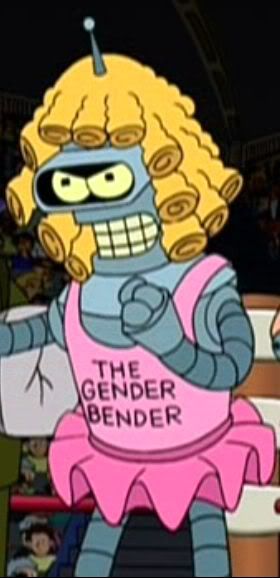



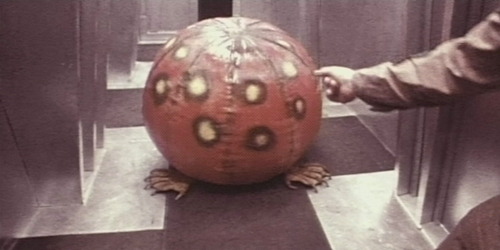

























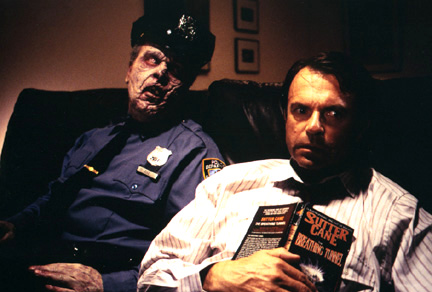






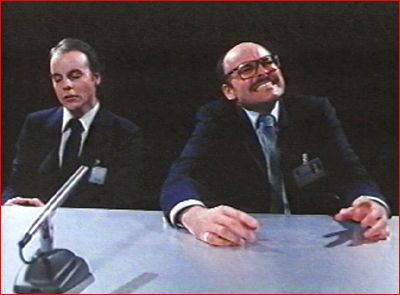
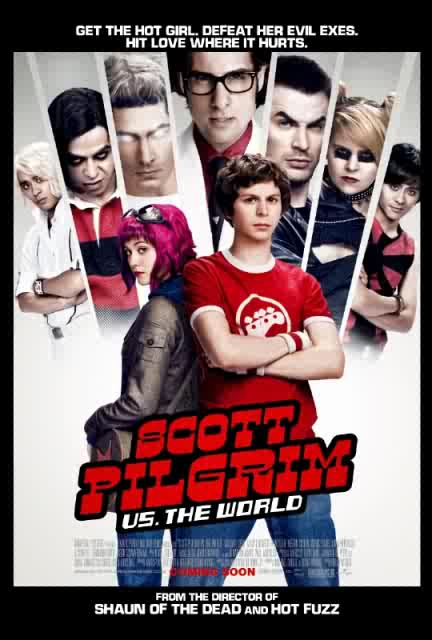



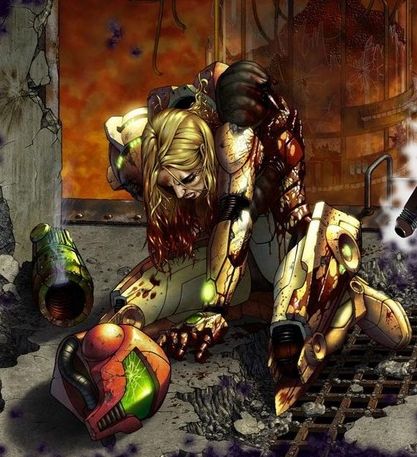

![[info]](http://l-stat.livejournal.com/img/userinfo.gif)



























